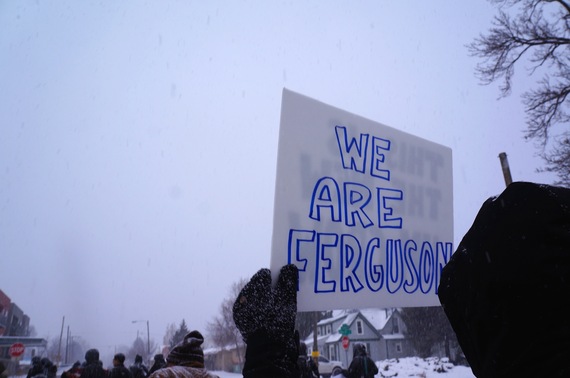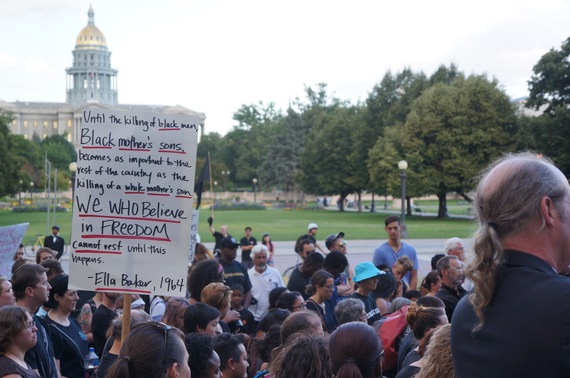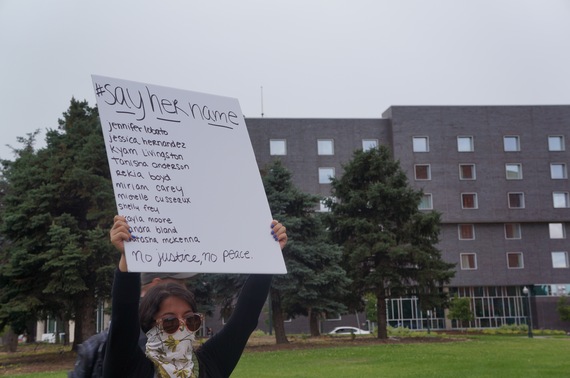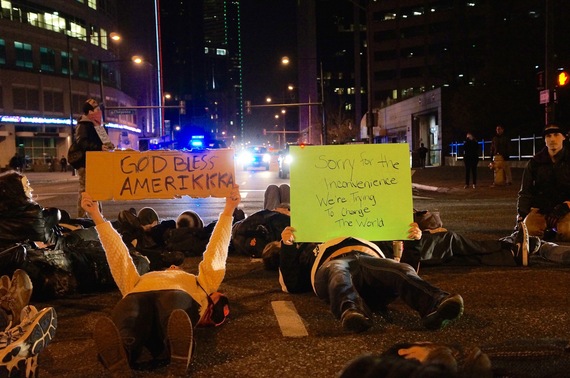"Of course race has to do with it--we're talking about a white cop killing a Black teenager outside St. Louis," I practically screamed through a text message.
It was within a day or two of Mike Brown's killing by Darren Wilson and I'd been going back and forth with a white friend about the incident. The way institutional racism works means every time a cop interacts with someone, but perhaps especially a Black teenager in a Confederate state, race is implicated. I didn't need to know anything about Darren Wilson to understand this, he didn't even need to be white for it to be true. The neighborhoods we live in, our access to a quality education, unemployment rates, the quality of water we drink, the quality of air we breathe, the number and quality of home, automotive, and business loans available to us, the amount of wealth we hold, how we're treated by medical professionals, the odds of legal repercussions for using or dealing drugs, the impacts of poverty, criminal convictions, or dropping out of high school, the likelihood society will perceive us as suspect or criminal, the roots of policing itself, and of course, our dealings with the police--including fatal ones--are all shaped by institutional racism. When you benefit from your race in each of those situations, as white people do, it's easy to take those privileges for granted, or to assume they exist for everyone.
They don't. The world is not just.
And the flip side of our privilege, as it is in each of the above examples, is often oppression. Yet, talking to my friend he felt I was jumping to conclusions to say race had anything to do with Mike Brown's tragic killing. We should wait until they (other cops and predominantly white-owned and operated media) could research Darren Wilson's history for overt racist acts like using racial slurs, emailing racist jokes, or affiliation with a hate group like the KKK, he said. My friend's inability to immediately recognize the racial implications of Mike Brown's killing is emblematic of some pervasive and problematic viewpoints white people tend to hold regarding racism in the modern United States.
- We see it as a moralistic, individualized, and interpersonal issue.
- We only believe in its existence when it manifests overtly.
- We think institutional racism is a thing of the past that no longer impacts our lives.
Because of those common societal misconceptions about racism, there's an insidious and all-too-prevalent belief that white people who aren't engaging in blatant racist acts don't abet the fortification of white supremacist power structures. This mythos allows certain expressions of racism to fester uncontested, perpetuating an oppressive racial hierarchy that places whiteness at its peak. Antiracists need to get better at finding ways to tease out and confront this subtler style of racism that's common today. Of course we need to continue challenging blatant racist acts, jokes, slurs, opinions, entertainment, knowledge production, pedagogy, journalism, workplace practices, presidential candidates and their supporters, and so on. But there are severe limitations when that approach is our main focus. Most significantly, it's restricted to catching racist outbursts and mindsets as they manifest, rather than proactively working to uncover, correct, and prevent them. This leads to inaction, which benefits the racially stratified status quo. Ultimately, like we saw with my old buddy, this allows the pervasive effects of institutional racism to evade our notice.
Understanding Racism In 2016
Racial attitudes change with time, as do the harmful ways they manifest and need to be opposed. A few decades ago calling out public displays of racism was a significantly braver and more exceptional act than it is in 2016. And while it remains essential, white antiracists need to expand our repertoire beyond this responsive approach. Last month I proposed the Platinum Rule as one possible way of going about this, and best practices will vary based on a number of dynamics and individual situations. But since almost all white people have at least some white peers, friends, and family, let's consider a few ways we can seek to reveal and challenge today's subtler racism in the white people closest to us, and to motivate them to take action to dismantle white supremacist power structures.
One place to begin is examining your family history. If you're white, there's no doubt it's rife with examples of ways historic access to white privilege offers you inherited benefits. By understanding the systems of power and historic legacies of whiteness working to your advantage--regardless of your individual actions, desires, and motivations--you can better understand how those same systems of power and historic legacies marginalize Others. Learning about your family's historic institutional advantages shines light on the institutional disadvantages faced by nonwhite people.
Did your family choose to immigrate to the US rather than come in bondage, fleeing imperial or colonial violence, or get displaced by the arrival of whites on the continent? Mine did. Did your family immigrate to the US at a time when some nonwhite people were denied the opportunity? Mine did. Did your family purchase a home in a segregated neighborhood that offered them a boost into the middle class that denied Black families? Mine did. Did your family get a home loan during a time that loans systematically denied many nonwhite people? Mine did. All of these aspects of my genealogical timeline come with heritable gains due to nothing other than my whiteness. Being cognizant of this doesn't mean I'm ashamed of things beyond my control, it simply means I'm aware of my head start.
Make no mistake, though. Institutional racism, along with white supremacy and its white privilege byproduct, aren't ancient history. Or history at all. Do you have a white-sounding name? Me too. That makes the odds much better we'll get a call back for a job, while someone with a Black-sounding name is deprived of the opportunity. Are you white and plan to take out a home loan in your lifetime (or already have)? Lucky us. Or more accurately, systematically-advantaged us. The rate on our loans will be/is better due to our whiteness--especially compared to the rates given to Black women--a reminder of the intersectional nature of oppression. The same is true for the rates of auto loans.
Recognizing ways we benefit from our whiteness reveals the institutions underlying these advantages. This, ideally, will compel us to support and work towards making radical changes to those institutions.
Challenging Racism In 2016
One aspect of white privilege is the invisibility of whiteness (paywall), so we need to instigate conversations about race with white people who don't usually have them. Social media isn't a helpless medium for having these discussions, but it can be a frustrating space. My advice for when you're talking to someone who is being willfully obtuse is to use their comments to highlight why they're problematic, rather than directly argue with them. This is helpful for people observing the discussion, and far less frustrating and ineffectual for you than working to convince the un-convincible. Dialogue with people who you're connected to beyond social media is more likely to yield productive results regardless of the medium. Take the time to do this. I know it's something I can do more of. We need to sit with the discomfort. We need to be willing to risk relationships. Our failure to have these conversations is more than merely uncomfortable for people impacted by racism, it's deadly. Having an awkward chat about race with white friends, coworkers, and family is the least we can do.
We also need to make sure we're finding ways to challenge people who promote race erasure (aka colorblind racism), embrace racialized paternalistic views, and otherwise perpetuate systems of oppression either tacitly, unintentionally, or without reflection. It's not at all uncommon for white activists in radical circles, the academy, or otherwise organizing around issues of social justice to harbor and espouse problematic views on race. Rather than ignoring these subtler aspects of racism to shoot fish in a barrel challenging the overt and resolute racism more commonly found on the Right, white antiracists should focus on reeling in white people who are more likely to view themselves as, or to be potential members, of antiracist coalitions. I've never been a believer in the notion that we need to convince outright racists to stop being racist so much as we need to convince people who view themselves as non-racists to commit to becoming antiracists.
And finally, we need to animate other white people to challenge problematic behavior in white spaces, to listen to people from marginalized communities, and to engage in antiracist education, activities, reflection, discussions, demonstrations, and events. Action begets action, and we need to compel one another to act.
One way to do this is to model it.
I was never quiet about social, economic, and racial justice, but after August 9, 2014 -- the day an unarmed Mike Brown was gunned down by Darren Wilson and left on the street for over four hours -- I've been increasingly involved in radical activist circles, and even more vocal and forceful with friends, family, and strangers, both online and in person, discussing these issues. (All love and praise to The People of Ferguson who took to the streets and compelled many of us to such action.) And what I've seen in the time since is friends and family I never would've expected to see discussing racism posting, liking, and commenting on articles and stories that delve into the subject.
I'm not suggesting this is the result of my influence, and certainly my action has been motivated by antiracists who act as role models for me. I don't know what my impact has been on those around me, but there seems to be little question that as we become more emboldened so do those around us. The more we speak up, share articles, books, speeches, and other communiques about racism (seek out Black and/or authors of color), the more we talk about how we benefit from white supremacist power structures, the more we can help other white people understand the nearly infinite number of ways they benefit as well. And, ultimately, move toward changing both the undergirding attitudes that perpetuate this system of white supremacy, and tearing down its institutional infrastructure.
There's no shortage of things that we can relate from our own lives and family history that might be revelatory to white friends across the political spectrum regarding how they too benefit from their whiteness, and in turn, how nonwhites are oppressed by it. Plenty of whites remain oblivious, comfortable believing the myth that good intentions or an absence of explicitly racist beliefs and actions absolve us of harboring racial animus or benefitting from our whiteness, which consequently only reifies white supremacy. It's time we step back, reconsider the varying ways racism manifests in 2016, and get on the offensive, rather than relying on the reactive tactics of yesteryear.
(All photography by Jesse Benn)




